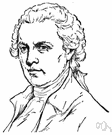Copley, the celebrated painter, then a young man and a resident of Boston, came one day to visit Drowne; for he had recognized so much of moderate ability in the carver as to induce him, in the dearth of professional sympathy, to cultivate his acquaintance.
"My friend Drowne;" said Copley, smiling to himself, but alluding to the mechanical and wooden cleverness that so invariably distinguished the images, "you are really a remarkable person!
Copley," answered Drowne, turning his back upon Wolfe's image in apparent disgust.
"This is strange," cried Copley, looking him in the face, which now, as the painter fancied, had a singular depth of intelligence, though hitherto it had not given him greatly the advantage over his own family of wooden images.
Copley turned again to the images, conceiving that the sense of deficiency which Drowne had just expressed, and which is so rare in a merely mechanical character, must surely imply a genius, the tokens of which had heretofore been overlooked.
As Copley departed, happening to glance backward from the threshold, he beheld Drowne bending over the half-created shape, and stretching forth his arms as if he would have embraced and drawn it to his heart; while, had such a miracle been possible, his countenance expressed passion enough to communicate warmth and sensibility to the lifeless oak.
"Drowne," said Copley, who had hardly missed a single day in his visits to the carver's workshop, "if this work were in marble it would make you famous at once; nay, I would almost affirm that it would make an era in the art.
Copley," said Drowne, quietly, "I know nothing of marble statuary, and nothing of the sculptor's rules of art; but of this wooden image, this work of my hands, this creature of my heart,"--and here his voice faltered and choked in a very singular manner,--"of this--of her --I may say that I know something.
"The very spirit of genius," muttered Copley to himself.
In the dark eyes, and around the voluptuous mouth, there played a look made up of pride, coquetry, and a gleam of mirthfulness, which impressed Copley with the idea that the image was secretly enjoying the perplexing admiration of himself and other beholders.
"What sort of a fellow is this!" thought Copley. "A Yankee, and throw away the chance of making his fortune!
"And so would I," said Copley, the painter, "for the privilege of taking her picture."
 Copley - American painter who did portraits of Paul Revere and John Hancock before fleeing to England to avoid the American Revolution (1738-1815)
Copley - American painter who did portraits of Paul Revere and John Hancock before fleeing to England to avoid the American Revolution (1738-1815)